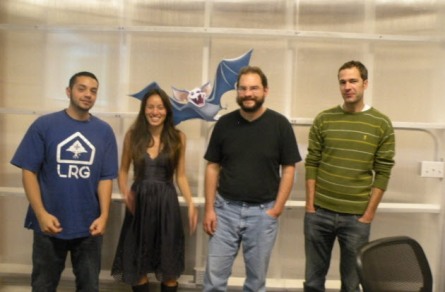Update: Ohai says the story is incorrect.
Electronic Arts has purchased social gaming company Ohai, according to a source familiar with the matter.
The deal has not been announced, so we aren’t sure what stage of the process the acquisition is in or when it will be announced, but the deal shows that EA is serious about social games and is picking up talent where it can in the competition to expand beyond traditional games into digital online markets.
[Update: Amy Widdowson, marketing director at Ohai, said that the article on EA and Ohai is inaccurate; she said “we are in the process of completing a transaction but we have no further comment for you at this time.” I hear that EA interviewed some of Ohai’s employees but did not make a purchase.]
We aren’t sure of the purchase price, but we believe the company sold for a relatively low price. Ohai has been one of the also-rans in the social gaming business. But the company assembled a good team and managed to ship games. It may have attracted bids from companies such as Kabam, Tencent, Perfect World and Aeria Games. (Those companies declined to comment earlier).
As we noted in our earlier story on the bidders for the company, Ohai is a San Francisco-based company started in the fall of 2008 by Susan Wu, (pictured under the bat), a former partner at Charles River Ventures. Wu, a former professional Quake 2 gamer, recruited a number of game veterans such as Blake Commagere, creator of the early Vampires game on Facebook; Scott Hartsman and Don Neufeld of Sony Online Entertainment. Both Commagere and Hartsman departed early.
Ohai raised $6 million in January, 2009, from August Capital and Rustic Canyon Ventures. It then set off to build some ambitious massively multiplayer online games on Facebook. With a team of about a dozen people, the company created City of Eternals, a vampire MMO that launched in the fall of 2009. The game had some very engaged users, but it ultimately wasn’t a success, partly because Facebook wasn’t a great platform for synchronous games, or those played in real-time. (At least, that was the case at the time of the launch.)
After that early lesson, Ohai went into production on more games built in Adobe Flash 3D. It was a bold strategy to leapfrog games that were asynchronous, or played one turn at a time. But the games didn’t take off in the same way that star Facebook game maker Zynga’s games did.
The sale is a logical outcome of what happens when you try to take on Zynga and don’t succeed.
Wu is not the CEO of Ohai anymore. Rex Ishibashi, who was formerly a board member of Ohai, says on his own LinkedIn page that he is the CEO of Ohai. (This change evidently happened a while ago.) Ishibashi and Wu did not respond to emails for comment.
One of Ohai’s latest efforts is Unicorn Parade, which may be formally launching soon.
 We’ll be exploring the most disruptive game technologies and business models at our third annual GamesBeat 2011conference, on July 12-13 at the Palace Hotel in San Francisco. It will focus on the disruptive trends in the mobile games market. GamesBeat is co-located with our MobileBeat 2011conference this year. To register, click on this link. Sponsors can message us at sponsors@venturebeat.com. Our sponsors include Qualcomm, Flurry, Greystripe, Nexage, Tapjoy, Fun Mobility, TriNet, Zong, Sibblingz, Open Feint, Spil Games and WildTangent.
We’ll be exploring the most disruptive game technologies and business models at our third annual GamesBeat 2011conference, on July 12-13 at the Palace Hotel in San Francisco. It will focus on the disruptive trends in the mobile games market. GamesBeat is co-located with our MobileBeat 2011conference this year. To register, click on this link. Sponsors can message us at sponsors@venturebeat.com. Our sponsors include Qualcomm, Flurry, Greystripe, Nexage, Tapjoy, Fun Mobility, TriNet, Zong, Sibblingz, Open Feint, Spil Games and WildTangent.
VentureBeat's mission is to be a digital town square for technical decision-makers to gain knowledge about transformative enterprise technology and transact. Learn More

